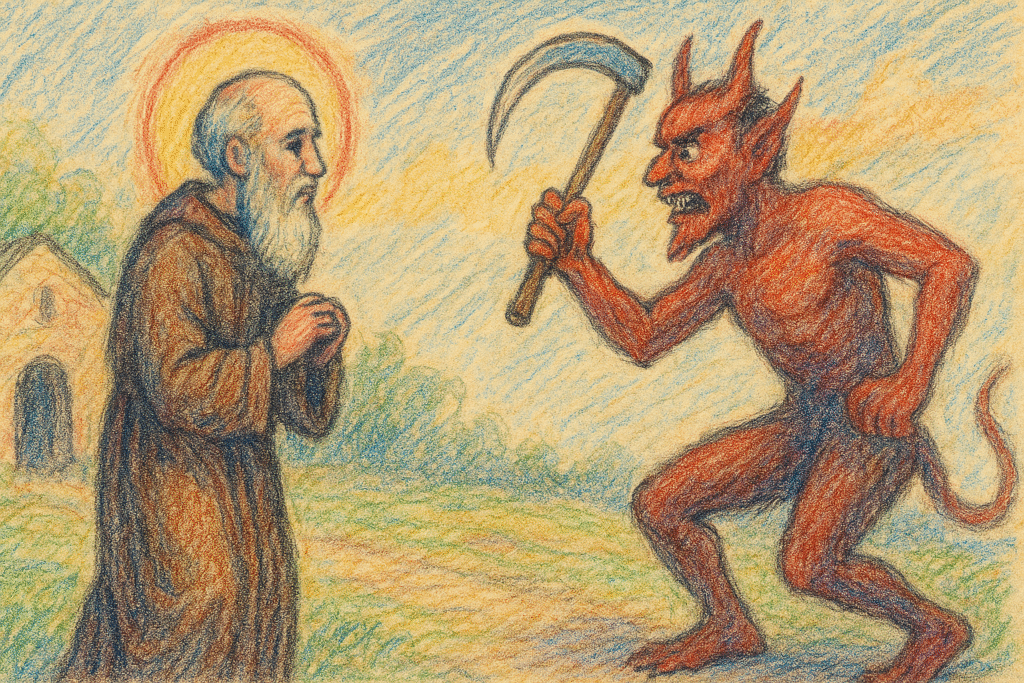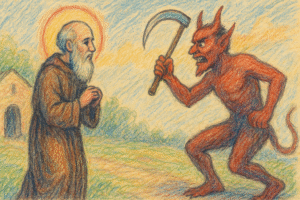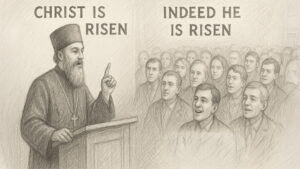One day, upon returning to his cell, Saint Macarius found the devil waiting for him with a sickle in hand, attempting to cut him in half. But when he tried to do so, he lost his strength and could not move the sickle. Then, filled with rage, the devil said to him:
“I endure too much violence because of you, Macarius, for I deeply desire to harm you and yet cannot. It astounds me greatly, because I do everything you do—and even more than you. You fast sometimes, but I never eat. You sleep little, but I never close my eyes. There is only one thing in which you surpass me.”
“What is it?” asked Saint Macarius.
“Your humility,” replied the devil.
That was the reason the devil was not able to harm him, he was a humble person. That was also the reason he became a saint, his humility. Humility is the foundation of the spiritual life, ordering the soul towards God by subduing self-will, recognizing one’s nothingness, and moderating external behavior. Pride, its opposite, corrupts the intellect, will, and actions, leading to self-exaltation and rebellion against divine order.
To grow in humility, it is very important to have in mind the 12 degrees that St. Thomas Aquinas explains following St. Benedict (cf. S.Th. II-II,161,6).
I. The Root and Foundation of All Humility: Fear of God and remembrance of His blessings.
1° First Degree: Keep alive the memory of all divine graces received.
II. Degrees That Order the Will by Overcoming Three Things: One’s own impulses, the difficulties of obedience, and hardships.
2° Second Degree: Do not seek to satisfy one’s own will.
3° Third Degree: Submit to superiors in obedience.
4° Fourth Degree: Bear with patience obedience in the harshest and most difficult matters.
III. Degrees That Order the Intellect by Recognizing One’s Defects:
5° Fifth Degree: Confess one’s sins and faults.
6° Sixth Degree: Sincerely acknowledge one’s own uselessness in all things—that is, recognize and confess that whatever one can do is not by one’s own virtue but by God’s sheer grace: “Not that we are sufficient of ourselves to think anything as of ourselves, but our sufficiency is from God” (2 Cor 3:5).
7° Seventh Degree: Consider and behave as the least of all.
IV. Degrees That Order Our External Behavior Humbly:
8° Eighth Degree: Submit in all things to common life, avoiding eccentricities (St. Benedict said: “Observe what is prescribed by the common rule of the monastery”).
9° Ninth Degree: Avoid wasting time in idle words, and thus, do not speak unless asked.
10° Tenth Degree (also concerning speech): Avoid excess in manner of speaking—both in quantity (vain chatter) and in tone (not speaking loudly, ostentatiously, or presumptuously, as if lecturing). St. Benedict said in his Rule: “Speak little, wisely, and in a low voice.”
11° Eleventh Degree: Restrain, above all, haughtiness in one’s gaze.
12° Twelfth Degree: Also concerning outward demeanor: avoid foolish laughter (false cheerfulness).






